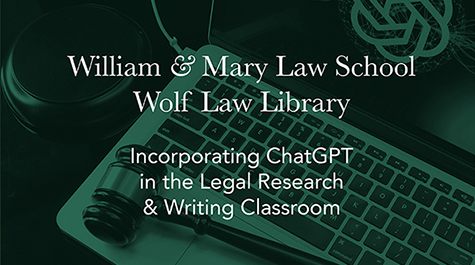William & Mary Law School Hosts Conference on the Role of ChatGPT in Legal Research & Writing Education
Innovative legal education? America’s first law school is on it.
On August 3-4, William & Mary Law School hosted a conference on “Incorporating ChatGPT in the Legal Research & Writing Classroom.”
More than 640 legal writing professors and law librarians registered for the virtual event. Attendees represented 169 individual law schools from six countries, seven governmental institutions, and eight law firms.
“This conference signifies not just our commitment to modernizing legal education, but also our dedication to anticipating the legal world’s evolving needs,” said A. Benjamin Spencer, Dean and Trustee Professor of the Law School. “By exploring the intersection of AI and law, we are preparing our students and faculty for the future.”
The event examined the implications, opportunities, and challenges of integrating AI technology, specifically ChatGPT, into the legal research and writing curriculum. The focus was on enhancing the teaching and learning experience in legal research and writing classes.
Eleven sessions were featured on a wide range of topics, including an overview of natural language processing and its applications in the legal field; how to use ChatGPT to generate legal documents; strategies for using ChatGPT to improve legal research and citation; techniques for editing and proofreading documents generated by ChatGPT to ensure accuracy and consistency; and more.
Laura Killinger, Director of William & Mary’s Legal Practice Program, and Leslie Street, Director of William & Mary’s Wolf Law Library, organized the conference to address pressing questions shared by legal educators.
“Our goal was to create a forum that merged the worlds of legal writing and legal research education,” Killinger said.
Recognizing the transformative potential of generative artificial intelligence, Street added that the event was envisioned “as a place for educators to exchange best practices, insights, and innovative approaches in harnessing AI’s capabilities for the legal research and writing classroom.”
Detailed summaries of each session, along with recordings, are available on the conference website.
The conference is part of a growing effort at William & Mary Law to examine how artificial intelligence and technology effect the learning and practice of law. This fall, the Law School is initiating new courses, and Dean Spencer recently publishing an op-ed on the importance of implementing AI-related topics in the curriculum.
About William & Mary Law School
Founded in 1779, William & Mary Law School stands as the first law school in the United States. With its rich history, it has consistently championed forward-thinking initiatives in legal education, preparing its students for the demands of the ever-evolving global legal landscape.
